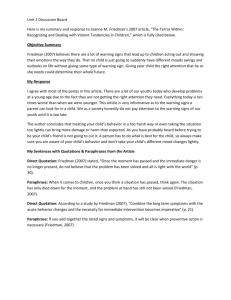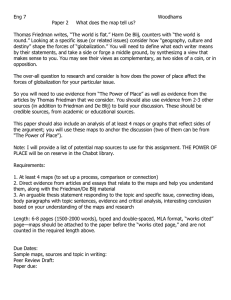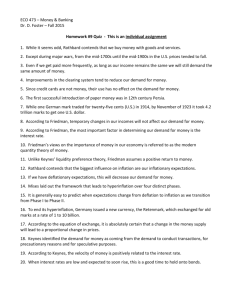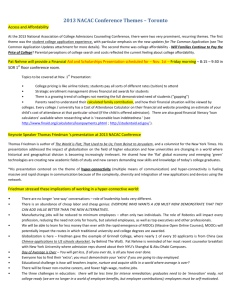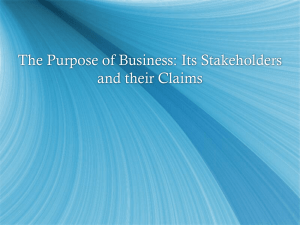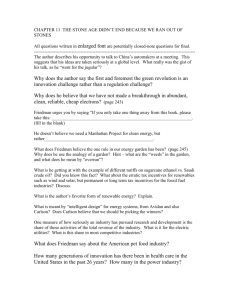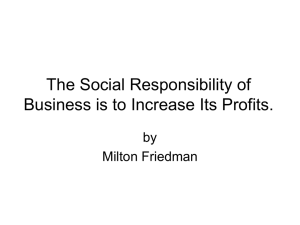Paul Healy, Rebecca Henderson, David Moss, and Karthik Ramanna
advertisement
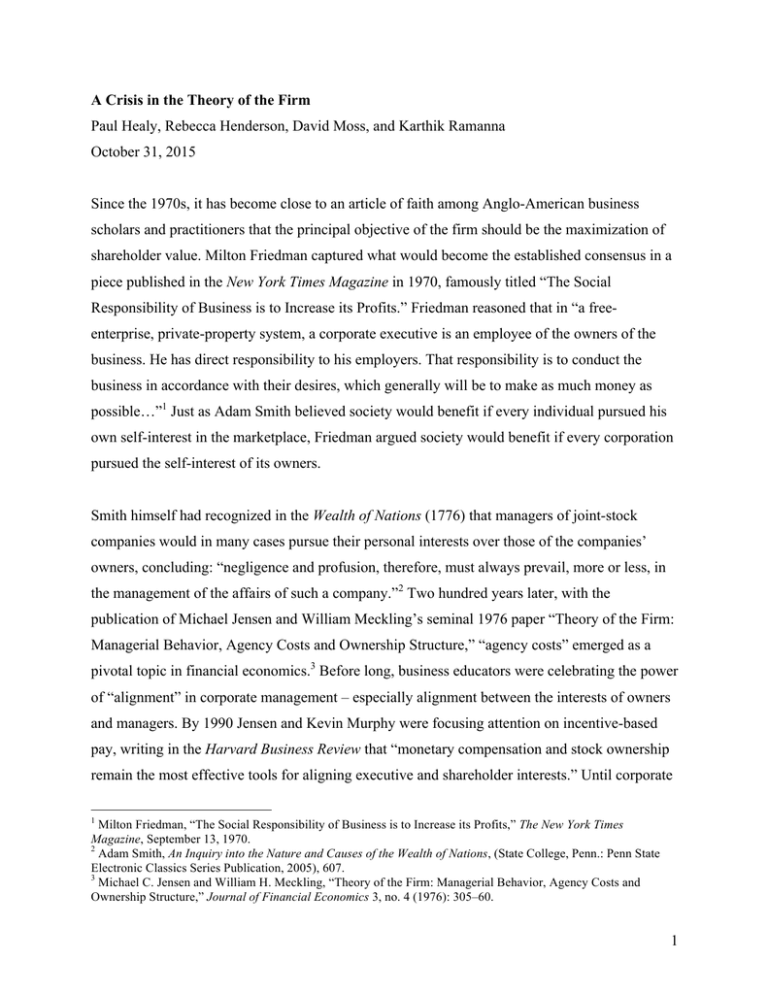
A Crisis in the Theory of the Firm Paul Healy, Rebecca Henderson, David Moss, and Karthik Ramanna October 31, 2015 Since the 1970s, it has become close to an article of faith among Anglo-American business scholars and practitioners that the principal objective of the firm should be the maximization of shareholder value. Milton Friedman captured what would become the established consensus in a piece published in the New York Times Magazine in 1970, famously titled “The Social Responsibility of Business is to Increase its Profits.” Friedman reasoned that in “a freeenterprise, private-property system, a corporate executive is an employee of the owners of the business. He has direct responsibility to his employers. That responsibility is to conduct the business in accordance with their desires, which generally will be to make as much money as possible…”1 Just as Adam Smith believed society would benefit if every individual pursued his own self-interest in the marketplace, Friedman argued society would benefit if every corporation pursued the self-interest of its owners. Smith himself had recognized in the Wealth of Nations (1776) that managers of joint-stock companies would in many cases pursue their personal interests over those of the companies’ owners, concluding: “negligence and profusion, therefore, must always prevail, more or less, in the management of the affairs of such a company.”2 Two hundred years later, with the publication of Michael Jensen and William Meckling’s seminal 1976 paper “Theory of the Firm: Managerial Behavior, Agency Costs and Ownership Structure,” “agency costs” emerged as a pivotal topic in financial economics.3 Before long, business educators were celebrating the power of “alignment” in corporate management – especially alignment between the interests of owners and managers. By 1990 Jensen and Kevin Murphy were focusing attention on incentive-based pay, writing in the Harvard Business Review that “monetary compensation and stock ownership remain the most effective tools for aligning executive and shareholder interests.” Until corporate 1 Milton Friedman, “The Social Responsibility of Business is to Increase its Profits,” The New York Times Magazine, September 13, 1970. 2 Adam Smith, An Inquiry into the Nature and Causes of the Wealth of Nations, (State College, Penn.: Penn State Electronic Classics Series Publication, 2005), 607. 3 Michael C. Jensen and William H. Meckling, “Theory of the Firm: Managerial Behavior, Agency Costs and Ownership Structure,” Journal of Financial Economics 3, no. 4 (1976): 305–60. 1 directors “adopt compensation systems that truly link pay and performance,” they warned, “large companies and their shareholders will continue to suffer from poor performance.”4 Such ideas helped to ensure that Friedman’s conception of the corporation triumphed, building a powerful new consensus around a shareholder-based theory of the firm. To be sure, there were always contrarian voices, calling for a broader “stakeholder perspective” on corporate activity or highlighting the importance of “corporate social responsibility.”5 But to the extent that it is possible to distinguish center from periphery in an intellectual landscape, for the last thirty years, at least in the context of Anglo-American capitalism, the shareholder-maximization school has commanded the center and its critics the periphery. Today, however, there is growing recognition of a crisis in the modern theory of the firm that has little to do with a stakeholder perspective or corporate social responsibility as traditionally defined. Rather, today’s crisis has to do with the political power – or, at least, the perceived political power – of the American corporation, an issue made particularly salient by the Supreme Court’s landmark Citizens United decision in 2010.6 Here we argue that if firms have the power to generate profits not only by producing socially beneficial goods and services, but also by tilting public policy and the “rules of the game” to their advantage (whether through aggressive lobbying, effective use of the revolving door between political and corporate appointments, or campaign contributions), then the core assumption that firms can maximize social value by maximizing shareholder value may not hold, and framing managerial responsibility as simply a matter of maximizing shareholder value may well be inappropriate. The normative basis for the idea that maximizing shareholder value maximizes social value rests on pioneering work conducted in the 1950s that established that, under conditions of perfect competition, free markets are Pareto efficient.7 Markets are unlikely to be even approximately 4 Michael C. Jensen and Kevin J. Murphy, “CEO Incentives: It’s Not How Much You Pay, But How,” Harvard Business Review 68, no. 3 (1990): 138–53. 5 For a review, see, e.g., Joshua D. Margolis, Hillary A. Elfenbein, and James P. Walsh, “Does it pay to be good? A meta-analysis and redirection of research on the relationship between corporate social and financial performance,” (working paper, Harvard Business School, 2007). 6 Citizens United v. Federal Election Commission, 130 S. Ct. 876, 558 U.S. 310, 175 L. Ed. 2d 753 (2010). 7 See, e.g., Kenneth J. Arrow, “An Extension of the Basic Theorems of Classical Welfare Economics,” in Proceedings of the Second Berkeley Symposium on Mathematical Statistics and Probability, ed. Jerzy Neyman 2 competitive, however, if a single firm or private group is able to shape the most primitive institutions of the market, or the rules and ethical customs that help to maintain them, to its own advantage. And if markets are not competitive, there is an inherent contradiction in the shareholder maximization theory of the firm. Maximizing shareholder value by deliberately distorting critical market institutions or regulations for private advantage seems unlikely to lead to the maximization of social value, and would therefore seem to be at odds with Friedman’s primary normative justification for shareholder value maximization as a manager’s only duty. Friedman acknowledged the importance of this issue in his 1970 New York Times piece, suggesting that firms should maximize profits “while conforming to the basic rules of the society, both those embodied in law and those embodied in ethical custom.”8 Ostensibly, the “basic rules of society” were those that would enable the functioning of competitive markets. Friedman appears to have concluded that two factors made it unlikely that firms would be able to reshape the rules of the marketplace to their own advantage. The first is that “the rules of the game and ethical custom” – including a shared commitment to competitive markets and to political institutions that might support economic freedoms – are fundamentally fixed, or at the very least, not susceptible to corporate pressure. A corollary to this assumption is the additional assumption that fundamental human (Anglo-American) preferences for markets and economic freedoms are basically exogenous and unchanging, so that, for example, corporate political advertising serves merely to inform voters of options that align with their base preferences, but does not realign voters’ preferences.9 The second factor is the notion that in equilibrium no single firm can have a significant effect on the rules of the game since in making the attempt it will face competition from multiple interest groups including labor unions, representatives of civil society and its own competitors.10 Just as firms, customers, and intermediaries compete and negotiate in price-based markets to achieve economic equilibrium and avoid monopoly, so too, it is often assumed that these groups will achieve political equilibrium in political markets. (Berkeley, CA: University of California Press, 1951), 507–32; Gerard Debreu, “The Coefficient of Resource Utilization,” Econometrica 19, no. 3 (1951): 273–92. 8 Milton Friedman, “The Social Responsibility of Business.” 9 See, e.g., George J. Stigler and Gary S. Becker, “De gustibus non est disputandum,” American Economic Review 67, no.2 (1977): 76–90. 10 See, e.g., Gary Becker, “A Theory of Competition Among Pressure Groups for Political Influence,” Quarterly Journal of Economics 38, no. 3 (1983): 371–400. 3 Friedman’s apparent confidence in the immutability of the rules of the game and ethical custom and in competition’s role in reducing the political power of any single company is puzzling given the fact that many of his colleagues at Chicago were pioneers in the field of regulatory economics, writing papers that suggested that firms often distorted the regulatory process in ways that imposed significant social costs. For example in 1971, the year after Friedman published “The social responsibility of business,” George Stigler, Friedman’s colleague at the University of Chicago, published “The Theory of Economic Regulation,” perhaps the most influential piece ever written on the problem of regulatory capture. “Regulation,” Stigler wrote, “may be actively sought by an industry, or it may be thrust upon it. A central thesis of this paper is that, as a rule, regulation is acquired by the industry and is designed and operated primarily for its benefit.”11 Stigler argued further that captured regulations – including especially barriers to entry, such as licensing requirements and import quotas – benefited incumbent firms at the expense of the broader public, which typically suffered from higher prices as a result. Moreover, whether the assumptions underlying Friedman’s theory of the firm were valid at the time he conceived of his theory, or whether they were ever valid, there is growing evidence to suggest that they are implausible today. Spending on elections by special interests, even before the Citizens United decision was handed down, was sizable and increasing. But total spending, particularly outside spending by so-called super PACs, jumped even more dramatically in the U.S. after Citizens United. External spending on presidential elections (i.e., outside of the campaigns themselves, but excluding party committees) surged from $338 million in 2008 to $1.039 billion just four years later (opensecrets.org). Although much of the growth has likely come from very wealthy individuals, rather than from business corporations, the increase appears to have intensified public concern about corporate money in politics.12 Such concerns are only reinforced by mounting behavioral science evidence that fundamental human preferences are far from immutable. The findings from this literature show that even subtle variations in choice 11 George J. Stigler, “The Theory of Economic Regulation,” Bell Journal of Economics and Management Science 2, no. 1 (1971), 3. 12 See, e.g., Nicholas Confessore and Megan Thee-Brenan, “Poll Shows Americans Favor an Overhaul of Campaign Financing,” New York Times, June 2, 2015, accessed June 2015, http://www.nytimes.com/2015/06/03/us/politics/poll-shows-americans-favor-overhaul-of-campaign-financing.html. 4 architecture can have profound influences on the revealed preferences of individuals, suggesting that the proposition that corporate activity merely communicates information rather than changes preferences seems increasingly questionable.13 In addition, while there is some evidence to support the notion that corporate attempts to distort the market are often met with vigorous and successful opposition, this result is by no means universal. Strong opposition requires that the issue at hand attract the attention of powerful and organized interest groups on both sides and/or that it is sufficiently salient to the general public that intermediaries such as the media and elected politicians act on their behalf. However debate over industry regulation is often dominated by those firms that are most affected by the regulation, since they possess the specialized experiential (tacit) knowledge that bears on the debate and that cannot be otherwise communicated to the regulators. As a result, there is increasing evidence that in a number of important cases corporate interests are able to exert disproportionate influence on the political process, and that in these kinds of “thin” political markets – such as financial reporting regulation, bank-governance regulation, and even certain forms of environmental regulation – the resulting rent-generating political advantages persist for significant periods of time at real social cost.14 In this context, Citizens United both highlights and makes significantly more acute a core conceptual problem at the heart of the modern theory of the firm. The decision overturned a federal law that prohibited corporations from making independent expenditures (e.g., on commercials or movies) in support of or opposition to a candidate in the run-up to a federal election. A 5-to-4 majority of justices held that because corporations were associations of individuals, they must enjoy speech rights no less than the individuals who comprised them; and because independent spending to support or oppose a candidate was political speech that did not threaten to corrupt lawmakers, it must be protected, irrespective of whether the speaker was a corporation or an individual citizen. 13 14 See, e.g., Cass Sunstein and Richard Thaler, Nudge (New Haven and London: Yale University Press, 2008). See, e.g., Karthik Ramanna, Political Standards (Chicago and London: The University of Chicago Press, 2015). 5 This means that corporations are now free to engage in independent election activities as a form of protected political speech. According to Friedman’s conception of the firm as it is popularly understood, managers should use this right solely to maximize their investors’ profits: indeed our reading of the current interpretation of the theory is that failing to use these rights to distort the political system to the advantage of the firm would be interpreted as a betrayal of managerial responsibility. But this seems odd, from at least two perspectives. First, in this context, the corporate rights confirmed – or conferred – by the court would seem to sit uneasily with the prevailing conception of the corporation, which explicitly abjures the idea of corporate social responsibilities. As Friedman put it, “Only people can have responsibilities. A corporation is an artificial person and in this sense may have artificial responsibilities, but ‘business’ as a whole cannot be said to have responsibilities, even in this vague sense.”15 Instead, Friedman argued, only individuals – the executives who run corporations – can reasonably be thought of as having social responsibilities, yet in the context of the firm (again, according to the prevailing theory of the firm) their only appropriate responsibility is to serve their shareholders, typically by maximizing profits, “while conforming to the basic rules of society.”16 One question, then, is whether the granting of speech rights to corporations carries with it any implicit responsibilities that might interfere with or complicate the existing responsibility of maximizing profits. Second, as we noted above, Friedman’s original suggestion is rooted in strongly held normative beliefs as to the effects of fully competitive markets on both social welfare and on individual economic freedom. To the extent that the Citizens United decision enables managers to attempt to significantly reduce the efficiency of the market through manipulation of the political process, a theory of the firm that encourages managers to act only to maximize shareholder returns, including by manipulating the political process to limit free or efficient competition, would seem to be in direct contradiction to the normative framework that justified the singular focus on shareholder value in the first place. More broadly, it is an open question as to whether Adam Smith’s vision of a good society, in which individuals unknowingly advance the public good by 15 16 Milton Friedman, “The Social Responsibility of Business.” Milton Friedman, “The Social Responsibility of Business.” 6 pursuing their own self-interest, is served or distorted when a business corporation seeks to maximize profits by investing its resources in political activities intended to bend public policy to its own advantage. Certainly, as business school faculty, we would feel uncomfortable offering a course in “how to manipulate the political system in order to increase your own profits,” even though such a course would seem entirely consistent with the current theory of the firm. If this contradiction does indeed exist, does it mean that we need a new theory? As we read the literature there are likely to be two major – and closely related – objections to the idea. The first is that in general the market itself can be relied on (at least in the long run) to generate the institutions that will support free competition and that the propensity of political processes to become corrupted inevitably reduces the market’s efficiency.17 Those who have advanced this argument have usually assumed that in cases where competitive markets endogenously fail – as, for example, in cases of natural monopoly – the social costs arising from unconstrained monopoly are lower than the costs of possibly corrupted government institutions. But, to our knowledge, there is no systematic evidence on this point. Moreover, at least in a modern democratic society, there has never been a case in which a market has generated all of the institutions necessary to its support – core institutions such as police power and the rule of law appear to be always supplied by the state. Indeed even Friedman noted that some basic government is necessary for the functioning of markets: “If we are going to cooperate with one another in a voluntary way, we have to know what the rules of this game we’re playing are… One of the very important and basic functions of government in a free society is to define those rules of the game and to adjudicate disputes among people.”18 A variant of this argument is to assert that even if there is little competition in the political process underlying the generation of regulation, competition in product markets will ensure that any regulatory surplus extracted by the corporations themselves will be only transient. Again, this would seem to be an empirical proposition for which we do not, as yet, have strong 17 18 See, e.g., Milton Friedman, Capitalism and Freedom (Chicago: The University of Chicago Press, 2002). Milton Friedman, “The Role of Government in a Free Society,” Speech at Stanford University, 1980. 7 evidence. Moreover, even in a scenario where competition means that an extracted regulatory surplus is passed on to customers, any form of rent extraction may be undesirable to a democracy since it suggests that the political process is being manipulated to design rules for a few (in this case, customers in a given market) rather than for society as a whole. The second major objection to our suggestion that the theory of the firm may need to be rethought relates specifically to agency problems. It is possible that the costs of altering the theory of the firm would outweigh the benefits, or that the cure is likely to be worse than the disease. The great strength of the current theory is its relentless focus on the control of agency problems within the firm. If managers have responsibilities beyond shareholder value maximization to, for example, the institutions of the free market itself – and if we were to act on the idea to release managers from a duty of focusing only on shareholder value – might that open the door the kinds of agency problems that the original theory was designed to address? If managers have an agency responsibility to “the system” as well as to their shareholders, why should we assume that managers have the information to exercise such a responsibility? And how could it be enforced? We do not know the answers to these questions. But we do not believe that ignorance is a reason not to ask them, and thus to avoid confronting the contradictions in the theory of the firm. As a legal matter there is nothing in Anglo-American law that either mandates corporate managers to only act in the interests of equity owners or prevents them from acting in the broader public interest, and, as an empirical matter, there are numerous cases of joint-stock corporations committing to serve multiple stakeholders (e.g., listed “B” Corporations), and these corporations do appear to survive in competitive capital markets. But it may be that even if holding managers to the maximization of shareholder value does not maximize social welfare – and might, in certain cases, actively reduce it – the agency costs of doing anything else would be, on average, even more costly. We do not know this to be the case. It has taken us at least fifty years to design institutions that can support the maximization of shareholder value as the central responsibility of managers, and, indeed, this process is still ongoing. If there is a fundamental contradiction in this pursuit – and if this contradiction is at risk of subverting the very institutions that give 8 capitalism its legitimacy – surely it is worth exploring whether we can create mechanisms that can enforce the idea that managers also have a duty to the institutions that support free markets. As it happens, when the Harvard Business School was founded in the early twentieth century, Edwin Gay, the first dean, described its mission as that of teaching business people to “make a decent profit, decently.” We believe that it may be time to rediscover this idea, and at a minimum to explore the traditional medical school teaching “do no harm.” In the case of corporate behavior that might mean teaching managers that they should avoid activity that would injure the market itself, even if doing so might result in significant corporate gain. It might mean thinking hard about how one would enforce an agency responsibility to the institutions of capitalism. But in today’s political environment we believe this is a conversation well worth having. 9

